The world continues to grapple with the novel coronavirus pandemic, which has spread to every continent since December 2019 when it first emerged in the Chinese city of Wuhan in Hubei province.
As of March 24, COVID-19 – the disease caused by the coronavirus – has killed over 17,000 people and infected close to 400,000, according to a live-updating map of the outbreak that draws figures from the World Health Organization (WHO) and other agencies. While most of the confirmed cases are in mainland China, Italy has surpassed China’s death toll with over 6,000 killed.
Meanwhile, Israel, a country with over 1,500 confirmed cases of COVID-19 as of March 23, is dealing with the outbreak the best way it knows how — with humor and song. But even as the Health Ministry and local authorities begin to enforce a tighter lockdown in an effort to stem the pandemic, perhaps some of the most encouraging outcomes to develop out of this crisis is the amount social action being taken to help communities and the population at large deal with day-to-day life in self-isolation and quarantine.

NoCamels is highlighting some of the initiatives bringing people together – safely – during unprecedented times.
Israeli balcony ‘parties’
While more stringent measures are currently in place to drive everyone to practice social distancing – including a ban on social gatherings, the closure of all kindergartens, schools, and universities as well as public venues like malls, restaurants, gym, and theaters – Israelis are by nature warm, family-oriented, and highly social people making the current situation that much more difficult.
So they’ve found a new way to express themselves while also showing appreciation for the people around them, similar to the salutes and serenades in Italy. Balcony “parties” have become all the rage as families have gathered in cities such as Rosh Haayin, Jerusalem, and Petah Tikva, to dance or sing together there.
Israeli residents from across the country gathered on their balconies last Thursday evening to cheer for the medical professionals among us who have been working tirelessly to combat the spread of the novel coronavirus.
The act of solidarity, which was pre-advertised on social media and WhatsApp, where it spread like wildfire, prior to the 6pm start time, was broadcast on all of Israel’s primetime news shows.
Inspired by Italy’s initiative to unite neighborhoods through balcony performances, an Italian-born event planner who moved to Israel 11 years ago also established an initiative to “celebrate Shabbat at our windows” by inviting residents to go to their windows and sing international songs of the Sabbath, such as Shalom Aleichem and Lecha Dodi, as a united community just as the sun was setting.
Synagogues in Israel have been allowed to remain open, though gatherings of more than 10 are mainly prohibited and many religious leaders have asked their congregants to pray home, The Times of Israel reports, This has propelled the event planner to find a unique way to unite the community, noting that last week’s Torah portion was Vayakhel, which has a message that one should seek to unite with every member of the Jewish people.

The event planner tells NoCamels she called it “Shabbat at our windows” because “not every Israeli has a balcony.” She invites Jewish residents to continue the initiative in the coming weeks.
Supporting the elderly
In an effort to support Israel’s senior citizens, one of the country’s most-at-risk communities, organizations like Latet, Door to Dor, as well as Tel Aviv-Yafo municipality have found ways to launch initiatives that assist them while practicing social distance.
Latet
Latet, an Israeli non-profit organization providing for the basic needs of populations in poverty and food insecurity, launched an emergency response operation this month intended to assist isolated elderly people amidst the coronavirus outbreak, who lack access to food and who are confined to their homes
“The purpose of this critical operation is to minimize the spread of the virus by ensuring that elderly people will be able to stay home while still getting food assistance and personal hygiene products,” the organization said in a Facebook post.
The NGO has many options for those in Israel who want to volunteer, including sorting and packing emergency boxes of food and hygiene products at the organization’s logistics center in Har Tuv (Beit Shemesh) during the week; collecting and distributing emergency boxes to the elderly across the country without physical contact; and answering inquiries and calls from at-risk populations at the NGO’s Emergency Call Center.
All Latet volunteers must follow the Ministry of Health guidelines and hygiene measures in all areas of activity. Interested parties who want to volunteer can contact Latet by phone at *6833 or register online.
Door to Dor
Also eager to support the elderly community, Birthright Excel alumni Lior Avisar and Maya Klein founded Door to Dor.
Birthright Excel is the entrepreneurship, leadership and business program of Birthright, the NGO that sponsors free trips to Israel for Jewish young adults. Birthright Excel put out a call for action for its alumni across North America and Israel to develop initiatives that meet the new challenges faced by the spread of coronavirus.
Door to Dor (Dor in Hebrew means generation) is a service for the elderly who are unable to leave their homes due to the pandemic. Volunteers pick up prescription medicine, groceries, and other products and leave them at the person’s front door so there is no physical contact or risk. The volunteer then leaves the building and calls the person to confirm everything was delivered properly.
Launched last week, Door to Dor has already recruited more than 1,000 volunteers.
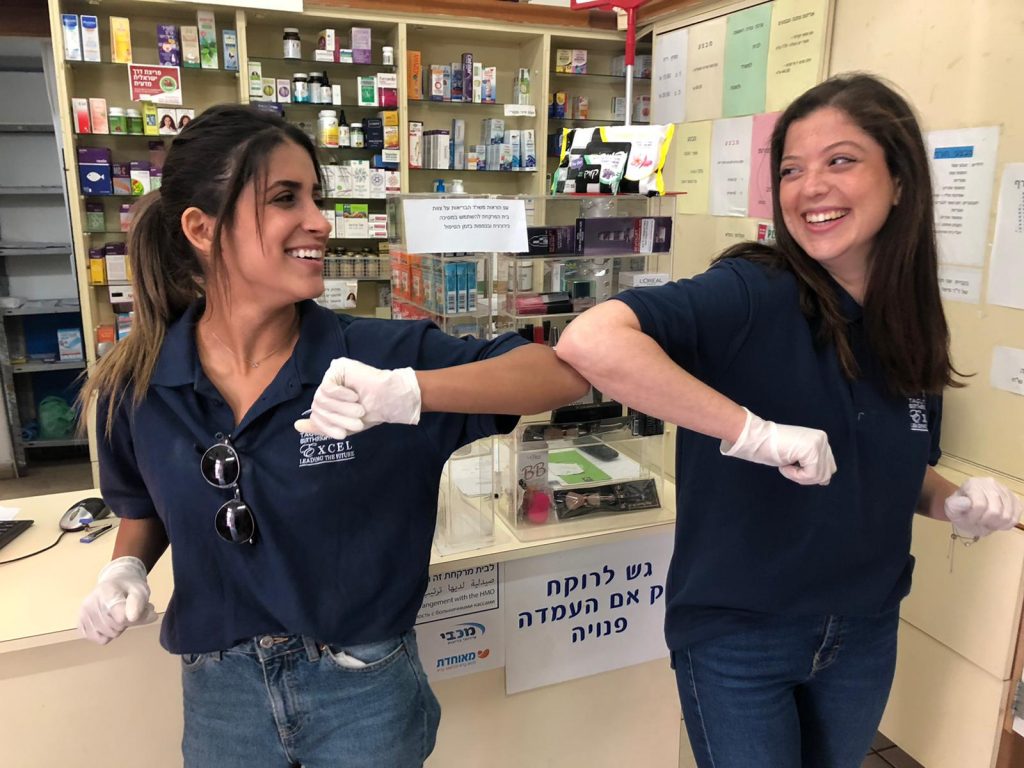
Tel Aviv-Yafo Municipality
Early Sunday morning, the Tel Aviv-Yafo municipality began distributing 6,000 food portions to elderly citizens confined to their homes and eager for assistance.
Dozens of volunteers, employees and over 40 city patrol vehicles took part in the distribution. The employees were food service workers in local schools who were out of a job due to a partial lockdown.
In order to prevent unnecessary risk to the senior citizens and in accordance with guidelines, assistance was provided through a distribution point, from which packages were sent to doorsteps without making direct contact with them.
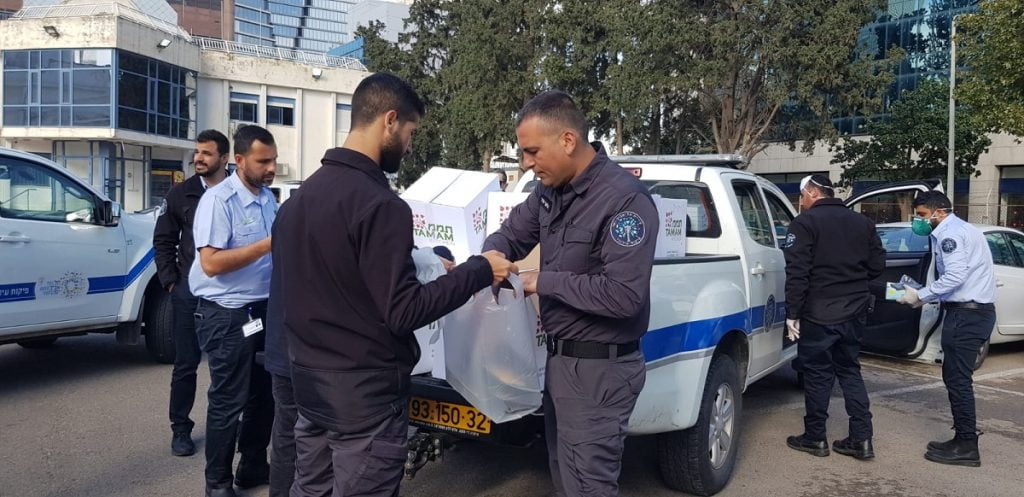
There have also been other projects run for the senior citizen community in Tel Aviv-Yafo in the past two weeks, including maintaining telephone contact with hundreds of seniors citizens throughout the city and tend to specific needs.
SEE ALSO: Coronavirus Crisis: These 6 Israel-Based Initiatives Are Working To Help China
Sign up for our free weekly newsletter
SubscribeERAN – Emotional First Aid by Telephone and Internet
Eran, the Israeli crisis organization founded in Jerusalem in 1971, has a dedicated coronavirus hotline which has received thousands of calls from people suffering from stress and mental health struggles amidst the coronavirus outbreak. The hotline provides support to residents in self-isolation who are dealing with anxiety or loneliness or who may be fighting with family, significant others, or roommates, in quarantine or isolation.
The organization, whose name stems from the Hebrew acronym for emotional first aid, provides 24/7 support in Hebrew, Arabic, Russian, and English through volunteers who offer advice on issues like panic and anxiety, depression mental illness, abuse, family pressures, marital troubles, loneliness, suicide, financial hardships, substance abuse, and sexual harassment or abuse.
Eran’s coronavirus hotline was created in collaboration with the Israeli Trauma Coalition and the Health Ministry. The hotline can be reached by dialing 1201 from any Israeli phone, followed by extension number six.
Quarantine Aid Israel
Amanda Govrin, a research assistant at Tel Aviv University, had the idea for a group related to quarantine aid after talking with some friends about how people in quarantine could stay zero-waste during this time.
“I am a volunteer with Plastic Free Israel, so the discussion was regarding the current situation from an environmental perspective and posts on our social media,” she tells NoCamels.
After checking through Facebook, she realized that no one in Israel had set up a way to connect people, so she created Quarantine Aid Israel, a Facebook group designed to assist those in need under quarantine, particularly those at risk like the elderly and immuno-compromised.
Govrin, who runs the group with admin Ariel Shay and two other moderators, said the response to the group went beyond expectations. Within one week there were 1,000 members and most of the posts were people offering their time.
Today, there are 1,300 members in the group and many also post asking for advice on how to deal with certain situations while in quarantine.
Govrin has been working on compiling a list of other groups and organizations that are helping reach those in need. She has reached out to 10 different organizations thus far and will share the information on how to help each of these groups in a post on the Facebook page.
“I hope people have made connections to help out. At the very least it is wonderful to see so many people coming together during this difficult time,” Govrin says.
ARDC Israel
There are some 36,000 asylum seekers living in Israel, as of April 2018, and many of them lost their jobs when the Health Ministry shuttered malls, restaurants, and other public areas earlier this month.
The asylum seekers, however, do not have a safety net and receive no unemployment benefits, Leah Hecht, director of operations and strategy for ARDC Israel tells NoCamels.
The African Refugee Development Center (ARDC), a Tel Aviv-based nonprofit organization founded in 2004 by African asylum seekers and Israeli citizens, has continued to coordinate educational and tech-based courses asylum seekers in the country.
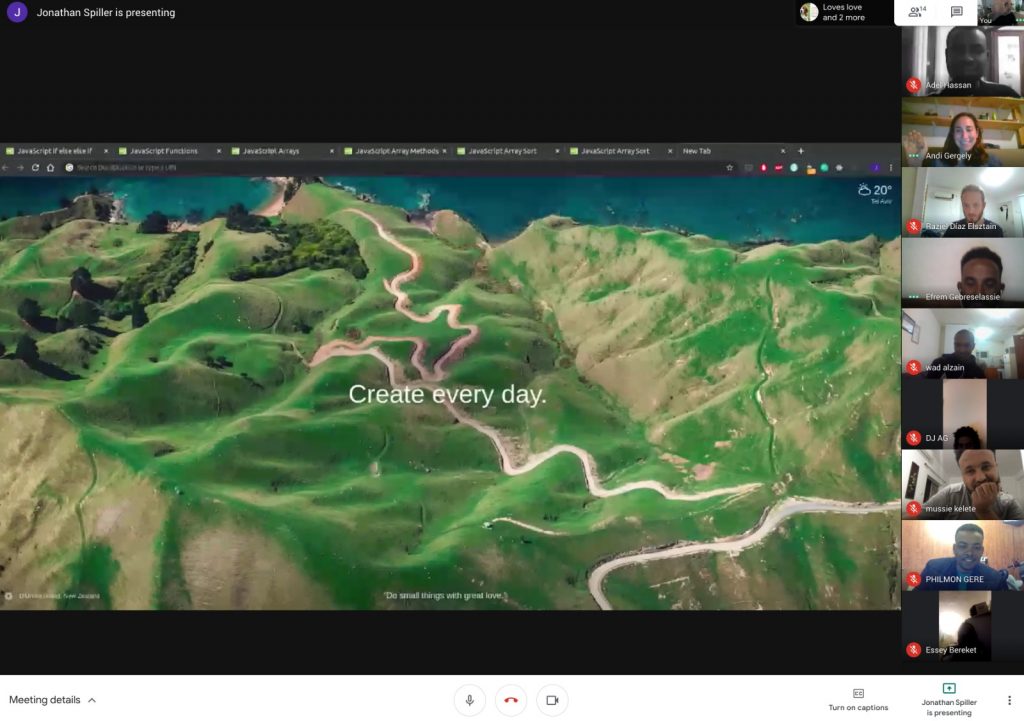
The organization currently offers educational programs like vocational training, pre-academic and academic studies (to help asylum seekers who may want to apply to institutes of higher education) as well as coding courses and vocational studies to teach marketable skills.
Amidst the current guidelines, the ARDC has moved all of its courses online and despite the technological barriers – many asylum seekers don’t have a personal computer – have noticed an uptick in participation.
“People are very stressed and they’re still contacting us asking what they can learn,” Hecht said, “What we’re seeing is truly inspiring.”
“We’ve had to shift our entire strategy,” added Guli Dolev-Hashiloni, ARDC’s education coordinator, “We had to create a manual for how to use Zoom. More people are eager to learn than ever before.”
In addition to the courses that have now gone online, ARDC has organized the delivery and distribution of various items to the refugee community. The group recently delivered 400 workbooks to kids last week, in coordination with Elifelet, an NGO dedicated to refugee children. They also delivered food to a community in Haifa, Hecht said, adding that the organization is also in the midst of organizing a food donation distribution to deliver meals to some 1,000 people.
Food donations and distributions are ongoing.
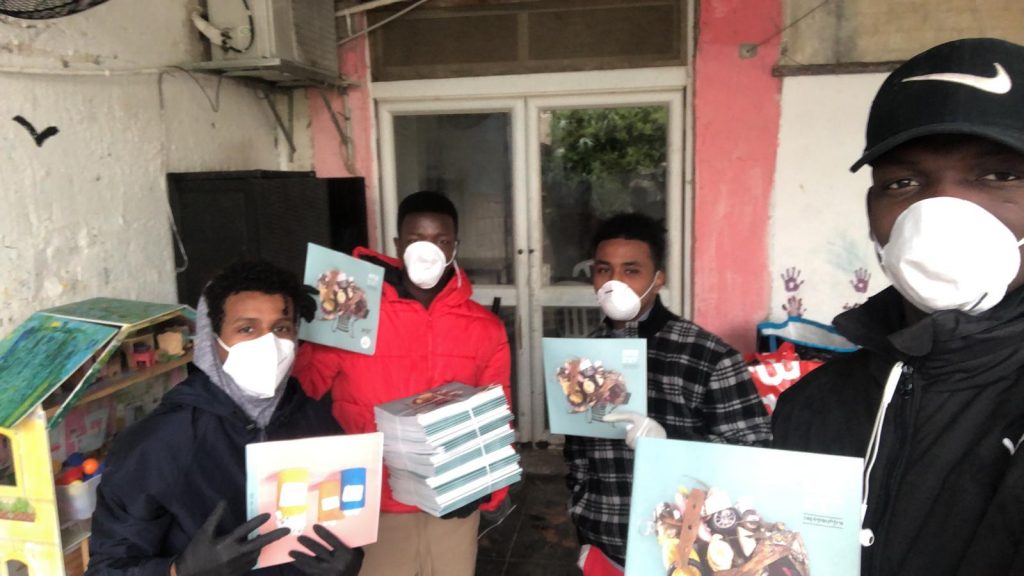
Volunteers that help distribute these items have been both asylum seekers and Israelis, ARDC said.
HackCorona
Last week, 150 computer programmers, software developers, designers, and innovators from the US and Israel virtually gathered to participate in HackCorona, a 24-hour hackathon from Thursday night through Friday to find solutions to alleviate the newest challenges caused by the coronavirus. The participants included members of the Birthright Excel community, who organized the project, interns from Massachusetts Institute of Technology (MIT), the private research university in Massachusetts and graduates of Unit 8200, Israel’s elite army intelligence unit. They came together to build projects and met via Zoom to discuss solutions.
Projects were split into three categories. In the “Working Remotely” category, participants created Quick Recap, an application that records online meetings and creates a short and concise video version of the meeting, along with a transcription. There was also DigiService, a platform that provides digital services, such as educational lessons, training, workshops and more.
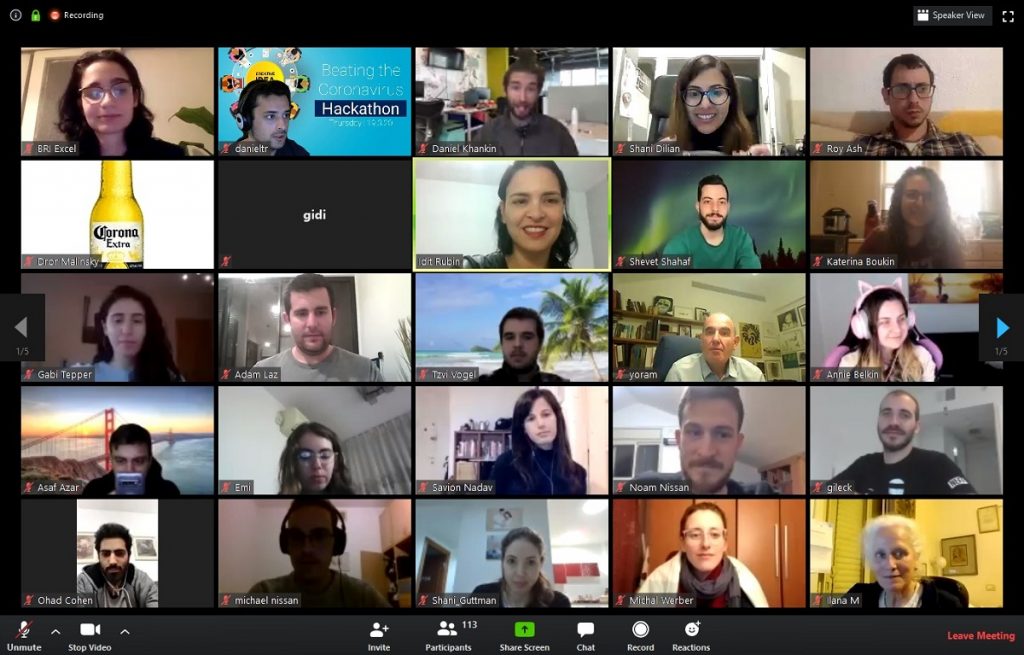
In the “Vulnerable Communities” category, based on creating solutions for vulnerable communities like the elderly or people with preexisting health conditions, participants created Veterunner, a bot that connects between people running essential errands (grocery, pharmacy) and those in quarantine who need delivery. Other participants created Seniorgarten, a virtual space where the elderly can connect with their loved ones via phone and other interactions and services.
In a “Distance Learning” category, participants created VRally, a virtual reality interface for children, which allows them to learn remotely in a variety of “fun” environments like a safari-themed classroom. In the “Open Track” category, dedicated to finding a challenge and a feasible solution, participants created CabiBus, a system that allows employees with work that has been categorized as priority to reserve a seat on a public bus for more efficient transportation during an emergency period.
“Before the new orders came into effect, while the corona[virus] began to gain momentum, we could not remain indifferent to the situation and thought of how we could help,” programmers and members of the Birthright Excel community Gila Hayat, Sapir Lazarovitch, Dana Beiski-Nissan, and Daniel Khankin, said in a statement, “This was a fully remote hackathon which allows everyone to connect and contribute from their own living rooms and share their technological and creative talents to solve problems that arise in this current situation. We are amazed and humbled by the organizations which joined our effort, and are confident that this initiative will continue in more virtual collaborations to come.”
Related posts

Rehabilitation Nation: Israeli Innovation On Road To Healing

Israeli High-Tech Sector 'Still Good' Despite Year Of War


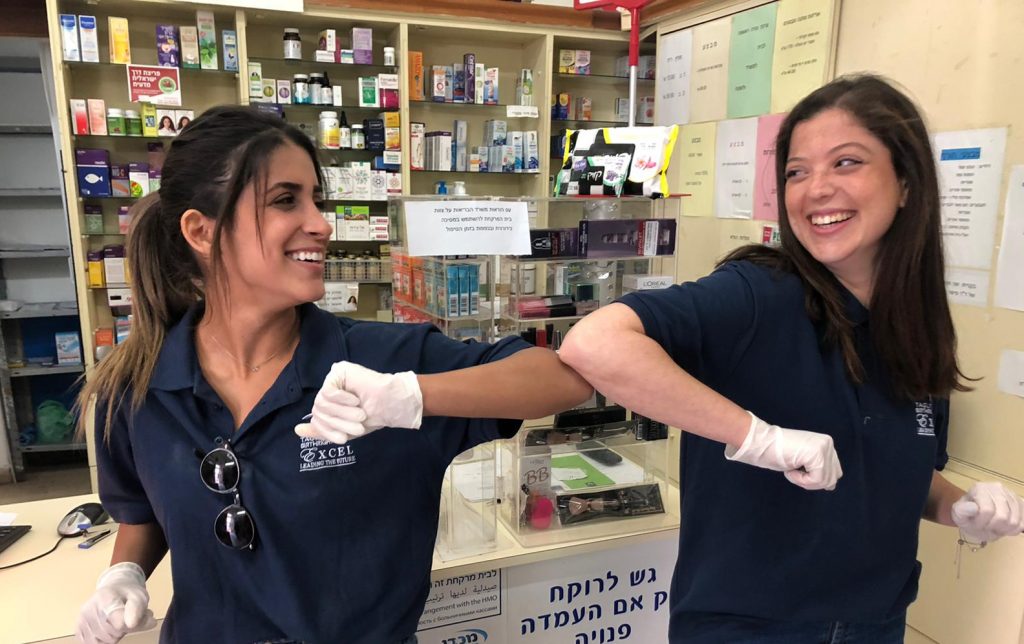


Facebook comments